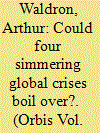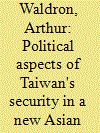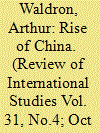|
|
|
Sort Order |
|
|
|
Items / Page
|
|
|
|
|
|
|
| Srl | Item |
| 1 |
ID:
143245


|
|
|
|
|
| Summary/Abstract |
Clearly, something has gone wrong with the U.S. Asian policy that has now been in place for more than forty years. Today, China possesses military and economic power undreamed of in the 1970s. And it has embarked on a course that seeks fundamentally to alter the political and territorial status quo in Asia while using military force as she seeks to acquire territories she claims, far from her continental territory. This article surveys how this new situation developed and details the problems it poses. It concludes that neither we nor our allies understand the present situation and are caught unprepared. The situation can be managed and retrieved to be sure, but not without some major and quite unexpected changes.
|
|
|
|
|
|
|
|
|
|
|
|
|
|
|
|
| 2 |
ID:
129851


|
|
|
|
|
| Publication |
2014.
|
| Summary/Abstract |
This article seeks to place recent developments in China in a larger context through three arguments. First, Chinese military policy has indeed made a major turning over the past decade; second, this turning is based on a fragile and unrealistic strategy that is already eliciting counterreactions that will make achievement of its apparent goals increasingly difficult. Finally, this strategy's failure will present China with unwelcome choices about how far to take her use of force. The "rise" of China is now encountering turbulence that may undo it.
|
|
|
|
|
|
|
|
|
|
|
|
|
|
|
|
| 3 |
ID:
145946


|
|
|
|
|
| Summary/Abstract |
More than once, I have heated milk on a gas stove only to have it boil over disastrously. The U.S. and its allies face at least four major and converging challenges that may also boil over like overheated milk, perhaps simultaneously. Social scientists will have more sophisticated frameworks, but this homely analogy of the full gas stove frames my points.
|
|
|
|
|
|
|
|
|
|
|
|
|
|
|
|
| 4 |
ID:
000654


|
|
|
|
|
| Publication |
Cambridge, Cambridge University Press, 1995.
|
| Description |
xix, 366p.: ill., mapshbk
|
| Standard Number |
0521472385
|
|
|
|
|
|
|
|
|
|
|
|
Copies: C:1/I:0,R:0,Q:0
Circulation
| Accession# | Call# | Current Location | Status | Policy | Location |
| 042045 | 951.041/WAL 042045 | Main | On Shelf | General | |
|
|
|
|
| 5 |
ID:
149041


|
|
|
|
|
| Summary/Abstract |
We may expect regional response to the tension and conflict in Asia begun by China in 2009 gradually to transform the international order in that region, where the United States has been the active great power. Today the United States is so overextended in commitments and so lacking in force structure (and political will) that she can no longer play that role. Nor, however, has China succeeded in her initial assumption that regional powers would defer to her vastly increased military power. Unless China finds a way to extricate herself, we may expect regional powers, each strengthening herself, to grow closer together as a group in which Tokyo plays an unaccustomed central role, both in diplomacy and arms supply, although in coordination with the United States. North Korea is also highly dangerous. The likely outcome is greater military strength generally, with South Korea and Japan nuclear powers.
|
|
|
|
|
|
|
|
|
|
|
|
|
|
|
|
| 6 |
ID:
050859


|
|
|
| 7 |
ID:
135939


|
|
|
|
|
| Summary/Abstract |
China's rise and clear ambition to change Asia poses both tactical and strategic questions, long neglected in Japan. Tactically, territorial challenges can be countered effectively by use of Anti-Access Area Denial [A2/AD] tactics, as Japan is now doing. The strategic issues: how to deal with a hostile nuclear super-power neighbor, counter nuclear blackmail, and so forth, are far more difficult. This author believes that US “extended deterrence” no longer exists. Washington in fact would never use nuclear weapons to defend Japan, whatever promises have been made. The only answer, and one that decreases rather than increases the possibility of conflict, is for Japan to acquire within a decade a minimal nuclear deterrent, too small for war-making but adequate to prevent attack, such as those maintained by Britain and France, who know America best. Without such a deterrent Japan will be defenseless against inevitable Chinese nuclear threats and blackmail.
|
|
|
|
|
|
|
|
|
|
|
|
|
|
|
|
| 8 |
ID:
148095


|
|
|
|
|
| Summary/Abstract |
The particular difficulties that Taiwan's new administration faces are paradoxical, for their origin no longer has to do with ensuring the continuing existence of the state. That seems assured. Rather, the challenges arise because U.S. and China's diplomacy in the 1970s assumed that Taiwan was going to disappear, but it failed to do so. This fact created an embarrassing—and probably insoluble—long-term problem for China. To be sure, much commentary still suggests that if not on the verge, Taiwan and China are at least on a one-way road to unification, shadowed by the concern that China will not wait forever, ready to “impose” unity when it is finally fed up.
|
|
|
|
|
|
|
|
|
|
|
|
|
|
|
|
| 9 |
ID:
114506


|
|
|
|
|
| Publication |
2012.
|
| Summary/Abstract |
With the announcement in 2010 that sovereignty over the South China Sea was a national interest comparable to Taiwan or Tibet, China has created a new geopolitical situation in East Asia. Although Peking would seem to expect that her neighbors, all relatively smaller than China, will accept these new claims, both initial reactions and political science theory suggest instead that a countervailing coalition will be formed to offset them. Just what Taiwan will do, however, is an important question given the island's key strategic position, its democratic government, and its increasing connectedness with China. This essay reviews the history of American approaches to East Asian alliances, arguing that at one time Washington considered dropping ties with Tokyo in favor of Peking. Then it examines the new situation, finding the United States uneasily seeking to balance China and Taiwan likely to join in.
|
|
|
|
|
|
|
|
|
|
|
|
|
|
|
|
| 10 |
ID:
170137


|
|
|
| 11 |
ID:
066916


|
|
|
| 12 |
ID:
091038


|
|
|
|
|
| Publication |
2009.
|
| Summary/Abstract |
The Chinese Communist Party's recent high-level meeting-the Fourth Plenum of the 17th Central Committee-concluded with a call to "strongly support the leadership of the democracy of the people by the internal democracy of the Party." Given the lack of actual democracy in China at any level, this resolution, highlighted in press reports, suggests that the Chinese party is seeking a solution to a fundamental problem in its own way. Just like the Soviet Union in its waning years, China is now grappling with increasing social complexity and differentiation, ethnic and political, which threatens the monolithic power of the Party.
|
|
|
|
|
|
|
|
|
|
|
|
|
|
|
|
|
|
|
|
|